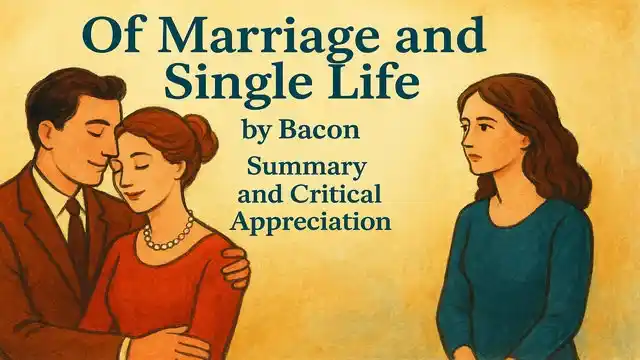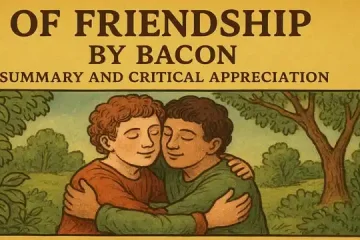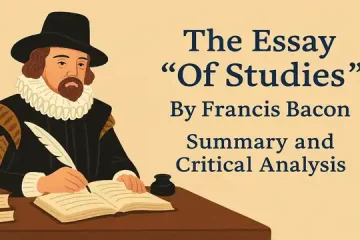Introduction of the Essay “Of Marriage and Single Life”:
The Renaissance greatly influenced the Elizabethan age, encouraging people to pursue pleasure while avoiding responsibility. Traditional morality declined, and both men and women often preferred temporary unions over the commitment of marriage. As reflected in Mephistopheles’ remark in Dr. Faustus—that marriage is merely a ceremonial toy—this attitude captured the spirit of the time. In this context, Francis Bacon composed his essay Of Marriage and Single Life to analyse the advantages and disadvantages of married life compared to single life, highlighting the conflict between personal freedom and social duty.
Summary of the Essay “Of Marriage and Single Life”:
Married Men and Risk-Taking:
The necessity of providing for wife and children prevents a man from running risks of any kind. A married man always has the welfare of his family in his mind. He cannot take any risks; he must passively accept his fault. He must be content with what his fortune allows him. He cannot rebel against his fortune, just as a person who has given hostage cannot rebel against his enemy. For a married man his wife and children serve as obstacles in the way of any bold, risky undertaking, whether this undertaking is noble or it is harmful and wicked. Any kind of bold, daring action is beyond him, a married man cannot take any risks, for he has not to look to his own welfare alone, but also to that of his wife and children. There is no doubt about it that work which is done for the welfare of the general people has been done by unmarried and affection for society as a whole , as married men.
Contribution of Unmarried Men to Society:
Unmarried men have the same men have for their family. Just as married men love their family and use their resources for its welfare, so also unmarried men love society, and use their resources to enrich it. Such people are the founders of hospitals, schools and other works of public utility. They are the benefactors of mankind. But it would be quite reasonable and natural to expect that married men must take care of the times to come; must do such noble deeds as are likely to make the future of society better and happier, for their children will live in that future. The better the future times, the happier will be their children. Ultimately, it will be their children, whom they love most of all, who are most valuable and precious to them, who will be living in that future society which if good will be for their benefit.
Self-Centred Unmarried Men:
Some men, who remain unmarried, think and care only for themselves. They do not worry either for the good of society or for the future. They are self – centred and do not think beyond their own lives, they are not interested in the future. They consider future as something which does not concern them, something useless or irrelevant and live only for the present. There are some others who regard wife and children as financial liabilities, as items or source of expenditure and so avoid having them. Besides these some there are still more foolish and money – minded men who are proud of the fact that they are unmarried and have no children, so that they may have a reputation of being richer than they really are. As they have no children, and so have to spend less than those who have children, people would regard them as richer than they really are.
Liberty as a Reason for Remaining Single:
Most probably they have heard people discussing amongst themselves that man is very rich because he has no children, whereas some other is not as rich because he has a large number of children to provide for , and so he must be put to great expenditure . Hence, he cannot be a rich man because children cause reduction in his financial resources. But the most common or frequently met with reason, why people remain unmarried is because they love liberty and they consider marriage a curtailment of their freedom and independence of action. There are some men who care only for their own pleasure, those who like to please themselves alone, and not others, some fanciful, eccentric, wayward people who love liberty so much that they consider marriage a check on their freedom of action. Here Bacon makes fun of such people. Their love of liberty is to excessive that they cannot tolerate even the least restraint on their liberty. Their love of liberty is so perverse that even such useful and necessary articles of dress as girdles and garters are regarded by them as restraints.
Qualities of Unmarried People:
Unmarried people are best friends, for they have not to care for their family, and so can devote themselves entirely to their friends. As masters, they are kind and sympathetic; they are not so exacting towards their servants as married people. Then as servants unmarried people are more free to devote themselves to their masters. But unmarried people are wayward and careless. Their conduct is not always proper. So, they do not make good citizens. As single men are free from family responsibilities, they are less steady in their conduct. Like soldiers without baggage, they can run away more easily from the performance of their duties as citizens of a state. Then, according to Bacon, single life is more suited for clergymen and priests.
Married vs. Single in Different Professions:
If one needs water to fill a pool than he will not have enough left to water the ground as well. Similarly, if a man has to satisfy the needs of his family first, he will have little to give to others. In other words, if a clergy has wife and children all his charity and love would first go to them and would be absorbed there whereas the primary duty of a clergy is towards his parishioners. In the opinion of Bacon, it does not matter much whether a judge or magistrate is single or married. His integrity and honesty is not at all changes by his marriage. If he is dishonest, he will remain so whether married or single. An honest judge, even if he has not one, but five wives, is preferable to a dishonest one who has not married.
Marriage and Soldiers:
In the case of soldiers it is desirable that they be married. The commanders of armies generally in their addresses to their soldiers just before a battle, the purpose being to encourage and inspire the soldiers, remind them of their wives and children who are waiting for them at home so that they would not be too rash and reckless in the battle field. Turkish soldiers are more unprincipled and mean; more cruel, for they have never experienced the tender feelings aroused by wife and children. Marriage has a softening effect on soldiers, and so is desirable for them.
Marriage Cultivates Humanity:
Wife and children certainly teach men to be more humane, kind and sympathetic. Their presence in the life is a training for men to be soft and tender in feelings; they develop those virtues which make men more humane. Though unmarried men are more generous, ready to extend pecuniary help because their resources are not exhausted since they do not have to meet the expenses of wife and children, but still they are more cruel and harsh and definitely would suit the job of Inquisitors, who during the Middle Ages in Europe used to preside over religious courts, tried and sentenced heretics. The unmarried people are like these Inquisitors, harsh and severe, because being unmarried and having no wife and children, their emotions of love and sympathy are generally not aroused, as they are in the case of a married person.
Fidelity and Steadiness in Marriage:
The result is that they grow cruel and hard-hearted. Persons of serious nature, who are guided in their action by tradition and custom, are more steady, less fitful and capricious; not changeable, as was Ulysses, the famous Greek hero of the Trojan war. On his return to Ithaca (his native island) he came across a beautiful enchantress named Calypso who offered to make him immortal, if he would give up his wife Penelope, and marry her. Ulysses rejected the offer of Calypso, and thus affirmed his fidelity to his old wife.
Women and Chastity:
Women, pure of character are more self – willed, headstrong and unreasonable. They are proud of their chastity, regard it as a great merit, and relying upon it, are often bold and forward in their behaviour. They do not sometimes care for the conventional properties which should govern the conduct of a woman. A wife is bound to be chaste and virtuous, as well as obedient, if she considers her husband to be wise. However, she will never consider him wise, if he is jealous. A jealous husband loses the respect of his wife and then she may not remain faithful and obedient. This should be a warning to jealous husbands.
The Value of Wives at Different Ages:
Wives are useful in all ages. For a young husband his wife is an object of sexual gratification. She provides him with sexual pleasure like a mistress. In middle age, when a man needs a friend and a companion, the wife fulfils this need. In old age, when the husband is sick, the wife looks after him, and nurses him to health. A wife is thus a ministering angel, and Bacon is fully alive to the blessings of a good wife.
The Right Time to Marry:
Thus, a man always has a logical reason to marry at every age. But Thales of Miletus, who was considered as one of the seven wise men of Greece gave his own conclusion about which was the right time to marry. According to his a young man lacks enough experience of life and hence should not marry; and when a man grows old it is too late for him to marry. In other words, a man shouldn’t marry at all! Bad husbands are often seen to have good wives.
Good Wives and Bad Husbands:
This could be because when a bad man shows kindness towards his wife, she appreciates it all the more because it is so uncommon in her life. Or perhaps the wife has made a virtue of her endurance of any harshness and is proud of this quality in herself and continues to be patient. A wife is always good to her bad husband if she herself has chosen him, against the advice of her well – wishers. She wishes to justify her foolish action (in choosing such a husband). She will never acknowledge that she was mistaken, and will continue to love her husband, even though he ill – treats her.
Critical Appreciation of the Essay “Of Marriage and Single Life”:
Introduction:
Like many of the other essays written by Bacon, “Of Marriage and Single Life” possesses a popular appeal. It deals with some of the most common experiences of human life. Bacon takes a balanced view of both the married and the single life. There are advantages and disadvantages in both. The man who has a family to maintain cannot undertake big risks. He wishes to lead a life of security. At the same time, a family is a financial liability. Marriage also imposes certain restraints on a man’s freedom. And yet a man who has wife and children is more affectionate and less cruel than a man who has remained single. There are some foolish rich men who would rather not have children so that they may be thought so much the richer.
Interesting Observation of Social Life:
An unmarried man, apart from enjoying unfettered freedom is in a position to confer great benefits upon the public. Besides, an unmarried man is a good friend, a good employer, and a good servant, though he may not be a good citizen. A clergyman will do well to remain unmarried, while a soldier will fight better when he thinks of the wife and children he has left behind at home. About judges and magistrates, Bacon is somewhat non – committal , though he does point out that it is better for society if a corrupt judge gets married.
Interesting Observation of Personal Life:
Bacon makes certain interesting observations about the nature and behaviour of women. A chaste woman feels proud of her chastity. A wife will be faithful and obedient to her husband if he has impressed her with his wisdom.
No jealous husband can command the respect of his wife. We whole-heartedly agree with Bacon when he points out that a wife is a mistress when husband is young, that she is a companion when he enters middle age, and that she is a nurse when he grows old. This obviously means that any age is good enough for a man to get married. This advice is, however, qualified by the paradoxical remarks that for a young man marriage is premature, and that an older man is no longer fit to marry. Bacon rounds off the essay by pointing out that bad husbands often have very good wives, and gives reasons for this strange phenomenon.
Ideas of Practical Wisdom:
It is clear from the above analysis that the ideas expressed in this essay are of great practical wisdom. These ideas go straight to readers’ heart and bosoms. These are ideas that can be understood and appreciated even by the ordinary reader. There is nothing very philosophical or very profound about the ideas of this essay. Most of the ideas are such as immediately get our approval. Who will not accept the view that a man who has to look after a family will not take risks in life? Nor can anyone quarrel with the view that many men value their freedom so much that they would rather go without marriage than curtail their freedom. That a wife and children have a humanising effect on a man is also beyond question. Thus, Bacon’s analysis of human nature in this essay as in other essays corresponds to well – known facts.
Use of References, Quotations and Latinism:
As regards its style, this essay shows the usual qualities that are associated with Bacon. Bacon is fond of allusions, quotations, Latin phrases and expressions, and figures of speech. We have here a reference to Ulysses, a well-known hero of Greek mythology. There is a reference to the cruelty and hard-heartedness of Inquisitors who used to be employed to inflict punishment on heretics. There is a quotation from an ancient Greek philosopher, Thales who said, in reply to the question when a man should marry: “A young man not yet, an elder man not at all.”
Compact Style:
But the most striking quality of Bacon’s style in this essay is compactness. This essay like many others is an excellent example of compression and condensation. Some of the sentences in this essay have an aphoristic quality which makes them eminently quotable. Ahead are a few examples:
1. “He that hath wife and children hath given hostages to fortune.” (The idea here has been expressed most vividly, effectively, and memorably).
2. “Unmarried men are best friends, best masters, best servants, but not always best subjects.” (Here is an excellent sunning up of the case).
3. “Certainly wife and children are a kind of discipline of humanity.” (Here is an advantage of the married life which offsets the disadvantages stated in the opening sentence of the essay).
4. “Chaste women are often proud and forward as presuming upon the merit of their chastity.”
5. ” Wives are young men’s mistresses, companions for middle age, and old man’s nurses.” (This sentence combines wisdom with wit).
Bacon has a very aptly described the excessive love of freedom which prevents some men from getting married. He makes his statement very interesting by observing that such men “will go near to think their girdles and garters to be bonds and shackles.” He has also very aptly stated the case against a clergyman’s marrying: “for charity will hardly water the ground where it must fill a pool.”
For and Against Arguments:
The essay exhibits Bacon’s tendency to present a subject with all its pros and cons. He puts forward a balance sheet of assets and liabilities of married and single life. Each has its advantages and disadvantages. Everything is, however, bathed in the cold light of reason, and, emotion and sentiment are firmly suppressed, though some of the observations that Bacon marks are true and prove his sharp observation faculty; there is a national and scientific bias in the consideration of even domestic and emotional problems.
Utilitarian Approach to Life:
His approach to the matter is somewhat utilitarian Marriage makes men do better in certain spheres of work and has a detrimental effect is other spheres.
Conclusion:
Thus, Bacon’s ‘Of Marriage and Single Life’ is a representative essay that brings to light all the qualities of the essayist with a comprehensive discussion on the subject. The usual qualities of Bacon’s style are in evidence in this essay too. It is specially marked for its brevity, aptness and density. By its stylistic qualities alone, this is one of the finest essays in the English language. The popular appeal of the ideas enhances its excellence.




